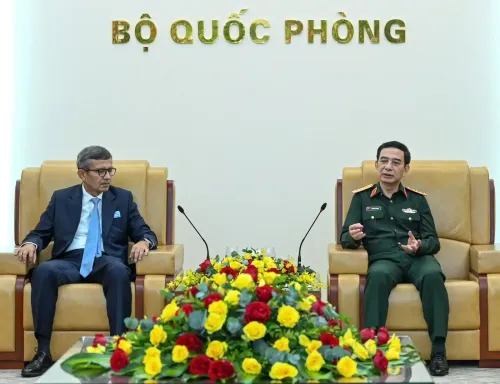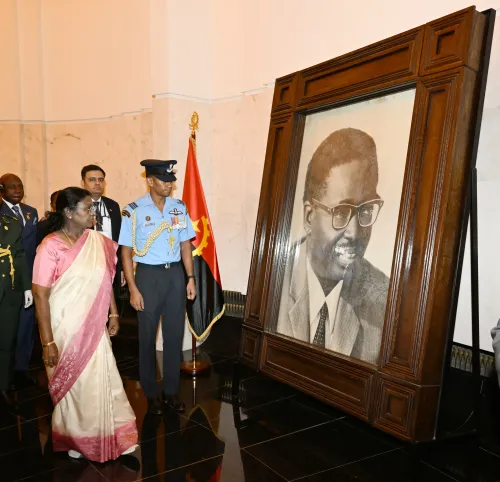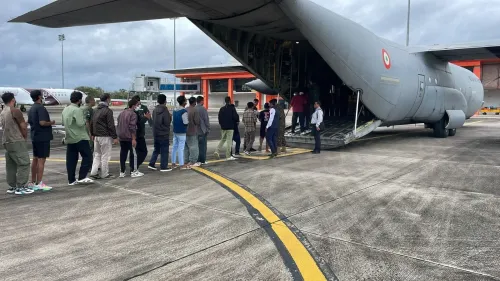Khyber-Pakhtunkhwa CM Critiques Pakistan's Afghan Refugee Deportation Policy

Synopsis
Key Takeaways
- K-P CM rejects forceful deportation of Afghan refugees.
- Federal government's policy on deportation deemed faulty.
- International community calls for humane treatment of refugees.
- UNHCR urges Pakistan to reconsider deportation strategy.
- Significant Afghan refugee population resides in K-P.
Islamabad, April 5 (NationPress) The Chief Minister of Khyber-Pakhtunkhwa (K-P), Pakistan, has declared that no Afghan refugee will be deported "forcefully" from the province, labeling the government's deportation strategy as faulty.
This announcement comes as various regions in the country initiate efforts to expel refugees, following a government directive.
Pakistan had imposed a deadline of March 31 for refugees, including those with Afghan Citizen Cards, to leave for their homeland, warning of forced deportation for those who do not comply, according to local news.
During a press briefing in Islamabad, Ali Amin Gandapur, a leader of the Pakistan Tehreek-e-Insaf (PTI) and K-P Chief Minister, reaffirmed his administration's stance against forceful deportation.
"We will not compel anyone. However, we are willing to assist those who choose to return voluntarily. The federal government's approach to Afghan refugees is flawed," Gandapur stated.
He further criticized the federal government, noting that while Pakistan's Foreign Office is engaging in discussions with Afghanistan, the overarching policy regarding Afghan refugees remains fundamentally problematic.
In the meantime, the federal government has commenced a crackdown in Rawalpindi and Islamabad, detaining 60 Afghan migrants.
In Karachi, local authorities began the forced repatriation of approximately 16,138 Afghan Citizen Card holders, with over 150 Afghans detained, as reported by the prominent Pakistani newspaper, The Express Tribune.
Despite international appeals for an extension of the deadline, Pakistani authorities have remained steadfast. The federal government has dismissed concerns raised by the UN High Commissioner for Refugees (UNHCR) and other organizations regarding the mass repatriation of Afghan refugees and asylum seekers.
Recently, UNHCR spokesperson Qaiser Khan Afridi expressed the agency's worries about the government's directive, highlighting that some Afghan Citizen Cardholders may be in need of international protection.
"We urge the government to consider their circumstances through a humanitarian lens. We also advocate for dialogue between Pakistan and Afghanistan to ensure that returns are conducted in a dignified and voluntary manner," Afridi added.
Earlier this week, the Afghan Taliban administration called on Islamabad to refrain from deporting Afghan nationals.
Mawlavi Abdul Kabir, Afghanistan's Minister of Refugees and Repatriation, has appealed to neighboring nations, including Pakistan and Iran, to cease these deportations and facilitate voluntary returns for Afghans.
He underscored the necessity of treating refugees humanely, especially given reports of mistreatment by bordering nations, including the deportation of individuals with legal visas, as reported by the Afghan state-run Bakhtar News Agency.
K-P accommodates the largest population of Afghan refugees in Pakistan, with Peshawar housing the highest number. Many of these refugees have resided in the province for decades, engaging in various businesses and occupations.
Pakistan's deportation policy has faced significant criticism, with numerous international organizations condemning the practice. They have voiced concerns regarding the severe risks that refugees encounter upon their return amidst the ongoing uncertainties in Afghanistan.









